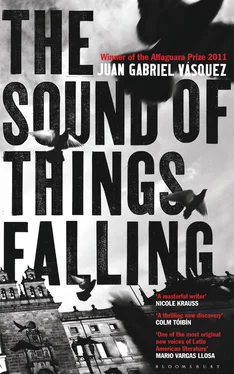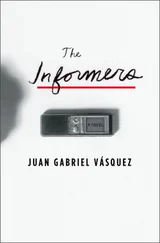‘It was forbidden,’ I said.
‘Yes. I’m shocked.’
‘By what?’
‘Everything seems smaller.’
She was right. We told a soldier we wanted to see the animals and asked him where they were, and Maya openly handed him a 10,000-peso note as encouragement. And so, guided or accompanied or escorted by a beardless youngster in camouflage cap and uniform who moved lazily, his left hand resting on his rifle, we arrived at the cages in which the animals were sleeping. The humid air filled with a dirty smell, a mixture of excrement and rotting food. We saw a cheetah lying at the back of his cage. We saw a chimpanzee scratching his head and another running in circles with nothing to chase. We saw an empty cage, the door open and an aluminium basin leaning against the bars.
But we didn’t see the kangaroo who kicked the football, or the famous parrot who could recite the line-up of the Colombian national team, or the emus, or the lions and elephants Escobar had bought from a travelling circus, or the miniature horses or the rhinoceroses, or the incredible pink dolphin Maya dreamt of for a week straight after that first visit. Where were the animals we’d seen as kids? I don’t know why our own disappointment should have surprised us, for the deterioration of the Hacienda Nápoles was well known, and in the years gone by since Escobar’s death various testimonies had circulated in the Colombian press, a sort of extremely slow-motion film on the rise and fall of the criminal empire. But maybe it wasn’t our disappointment that surprised us, but the way we experienced it together, the unexpected and especially unjustified solidarity that suddenly united us: we had both come to this place at the same time, this place had been a symbol of the same things for both of us. That must have been why later, when Maya asked if we could go as far as Escobar’s house, I felt as if she’d taken the words out of my mouth, and it was me who pulled out some wrinkled and grimy money to bribe the soldier with this time.
‘Oh no. You can’t go in there,’ he said.
‘And why not?’ asked Maya.
‘You just can’t,’ he said. ‘But you can walk around it and you can look in the windows.’
That’s what we did. We walked around the perimeter of the construction and together saw its ruined walls, its dirty or broken windows, the splintering wood of its beams and columns, the broken and chipped tiles of the outside bathrooms. We saw the billiard tables inexplicably still there six years later: in those salons that time had darkened and dirtied, the green felt shone like jewels. We saw the pool empty of water, but full of dry leaves and pieces of bark and sticks that the wind had blown in. We saw the garage where the collection of antique cars was rotting away, we saw the flaking paint and broken headlights and dented bodywork and missing cushions and seats converted into a disorder of popping springs, and we remembered that according to legend one of these machines, a Pontiac, had belonged to Al Capone and another, again according to legend, to Bonnie and Clyde. And later we saw a car that had never been luxurious but basic and cheap, however its value was undoubtedly great: the famous Renault 4 in which the young Pablo Escobar, long before cocaine became the source of his riches, competed in local races as a novice driver. The Renault 4 Cup, that amateur trophy was called: the first time Escobar’s name appeared in the Colombian press, long before the planes and the bombs and the debates about extradition, was as a racing-car driver in this competition, a young provincial in a country that was still a small province in the world, a young trafficker who was still making the news for activities other than that incipient trafficking. And there was the car, asleep and broken and devoured by neglect and time, the bodywork cracked open, another dead animal whose skin was full of worms.
But maybe the strangest thing that afternoon was that everything we saw we saw in silence. We looked at each other frequently, but we never spoke anything more than an interjection or an expletive, perhaps because all that we were seeing was evoking different memories and different fears for each of us, and it seemed imprudent or perhaps rash to go rummaging around in each other’s pasts. Because it was that, our common past, that was there without being there, like the unseen rust that was right in front of us eating away at the car doors and rims and fenders and dashboards and steering wheels. As for the property’s past, we weren’t overly interested: the things that had happened there, the deals that were made and the lives that were extinguished and the parties that were held and the violence that was planned, all that was a backdrop, scenery. Without a word we agreed we’d seen enough and began to walk towards the Nissan. And this I remember: Maya took my arm, or slipped her arm in mine like women used to do in times gone by, and in the anachronism of her gesture there was an intimacy I could not have predicted, that nothing had foretold.
Then it began to rain.
It was just drizzle at first, although with fat drops, but in a matter of seconds the sky turned as black as a donkey’s belly and a downpour drenched our shirts before we had time to seek shelter anywhere. ‘Shit, that’s the end of our stroll,’ said Maya. By the time we got to the Nissan, we were soaked to the skin; since we’d run (shoulders raised, one arm up to shield our eyes), the fronts of our trousers were wet through, while the back, almost dry, seemed made of a different fabric. The windows of the jeep fogged up immediately with the heat of our breathing, and Maya had to get a box of tissues out of the glove compartment to clean the windscreen so we wouldn’t crash. She opened the vents, a black grille in the middle of the dashboard, and we began to move cautiously forward. But we had only gone about 100 metres when Maya stopped suddenly, rolled down the window as fast as she could so I, from the passenger seat, could see what she was looking at: thirty steps away from us, halfway between the Nissan and the pond, a hippopotamus was studying us gravely.
‘What a beauty,’ said Maya.
‘Beauty?’ I said. ‘That’s the ugliest animal in the world.’
But Maya paid me no attention. ‘I don’t think it’s an adult,’ she went on. ‘She’s too little, just a baby. I wonder if she’s lost.’
‘And how do you know it’s female?’
But Maya was already out of the jeep, in spite of the downpour that was still falling and in spite of a wooden fence between us and the piece of land where the creature was. Its hide was dark iridescent grey, or that’s how it looked to me in the diminished afternoon light. The raindrops hit and bounced off as if they were falling against a pane of glass. The hippopotamus, male or female, juvenile or full-grown, didn’t bat an eyelid: it looked at us, or looked at Maya who was leaning over the wooden fence and looking at it in turn. I don’t know how much time went by: one minute, two, which in such circumstances is a long time. Water dripped off Maya’s hair and all her clothes were a different colour now. Then the hippopotamus began a heavy movement, a ship trying to turn around in the sea, and I was surprised to see such a long animal in profile. And then I didn’t any more, or rather I saw its powerful arse and thought I saw streams of water sliding over its smooth, shiny skin. It wandered away through the tall grass, with its legs hidden by the weeds in such a way that it seemed not to make any progress, but just to get smaller. When it reached the pond and got into the water, Maya returned to the jeep.
‘How long are those creatures going to last, that’s what I wonder,’ she said. ‘There’s no one to feed them, no one to take care of them. They must be so expensive.’
Читать дальше












